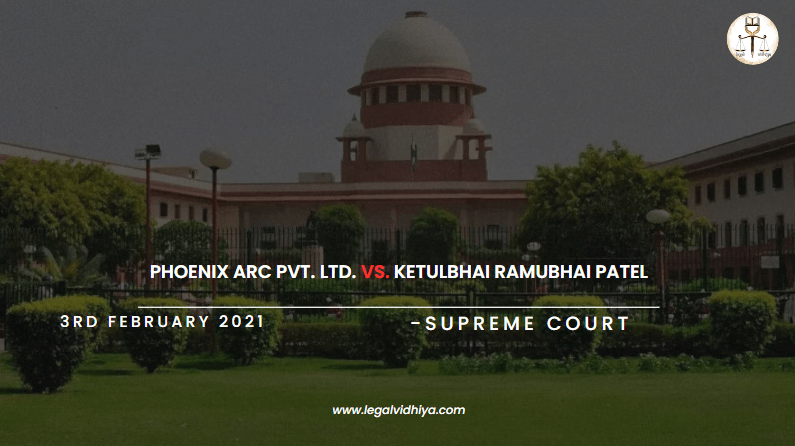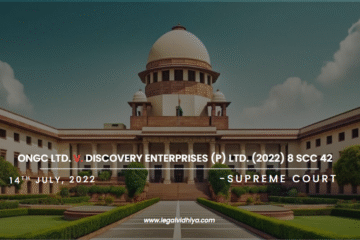
| CITATION | AIRONLINE 2021 SC 46 |
| DATE OF JUDGMENT | 3rd February 2021 |
| COURT | Supreme Court of India |
| APPELLANT | Phoenix Arc Pvt. Ltd. |
| RESPONDENT | Ketulbhai Ramubhai Patel |
| BENCH | Ashok Bhushan, R, Subhash Reddy, M.R. Shah, JJ. |
INTRODUCTION
The case involves an appeal made by Phoenix ARC Pvt. Ltd. against the National Company Law Appellate Tribunal for the dismissal of financial creditor application under the Insolvency and Bankruptcy Code, 2016 of the corporate debtor of Doshion Veolia Water Solutions Private Limited. The appellant had stood in the shoes of L&T Infrastructure Finance Co. Ltd. which had extended a loan facility to Doshion Limited, the corporate debtor’s parent entity. The corporate debtor had provided the securities in the form of shares of its subsidiary, Gondwana Engineers Limited for the loan. The primary legal question under consideration in the present case was whether the appellant could qualify as a financial creditor of the corporate debtor under the pledge agreement and deed of undertaking that was executed with the assignor, L&T Infrastructure Finance Co. Ltd.
FACTS OF THE CASE
- L&T Infrastructure Finance Company Limited provided a loan of Rs. 40 crores to the corporate debtor’s parent firm, Doshion Limited.
- The corporate debtor, Doshion Veolia Water Solutions Private Limited, has mortgaged 40,160 shares of its subsidiary Gondwana Engineers Limited (GEL) for the said loan.
- L&T Infrastructure transferred its own rights to the appellant Phoenix ARC Pvt. Ltd.
- Doshion Limited failed to repay the loan and the appellant sought to be acknowledged as a financial creditor of the corporate debtor in the insolvency process.
- The Resolution Professional, National Company Law Tribunal, and National Company Law Appellate Tribunal dismissed the appellant’s argument.
- Accordingly, the appellant proceeded to the Supreme Court of Appeal on the grounds that the pledge of shares constituted a guarantee.
ISSUES RAISED
- Whether Phoenix ARC Pvt. Ltd. is eligible to be a financial creditor of the corporate debtor, Doshion Veolia Water Solutions Private Limited under IBC, 2016?
- Is the pledge of shares by the corporate debtor a guarantee or a contract to discharge the liability of a third person that puts the appellant as a financial creditor?
- What is the difference between a ‘secured creditor’ and a ‘financial creditor’ under the Insolvency and Bankruptcy Code, 2016?
CONTENTIONS OF APPELLANT
The appellant, Phoenix Arc Pvt. Ltd., contended that:
- It is a financial creditor as defined under Section 5(8)(i) of the Insolvency and Bankruptcy Code, 2016.
- Another issue is that the liability of the corporate debtor as a surety does not exceed the liability of the debtor, and the creditor has full rights at its discretion to pursue its liability against the surety.
- In terms, L&T Infrastructure Ltd . A guarantee has been extended by the corporate debtor for the debts due from Doshion Ltd . In the case of non-payment, charge persisted for 100% shareholding of Gondwana Engineers Ltd.
- You should note that the term ‘guarantee’ should not be restricted to a limited definition and should include any third-party security for the repayment of financial obligations, including a share pledge.
- The decision relied in Anuj Jain vs. Axis Bank Limited is different from the present case.
CONTENTIONS OF REPONDENT
The respondent, Ketulbhai Ramubhai Patel, contended that:
- The appellant is not a creditor of any nature whatsoever of the corporate debtor.
- The appellant has no right of recovery of any debt from the corporate debtor and has a limited right of enforcing and realizing the value of its security in the shape of the shares pledged by the corporate debtor.
- The pledge cannot be construed in any way as a guarantee under the Contract Act.
- Section 5(8)(i) of the Code only relates to guarantee liability for any of the items specified in sub-section 5(8)(a) to 5(8)(h), and not for any other instrument which may be in the nature of a guarantee.
- The corporate debtor has also not executed any contract of guarantee with the appellant.
JUDGEMENT
The Supreme Court dismissed the appeal affirming the decisions made by the Resolution Professional, the National Company Law Tribunal, and the National Company Law Appellate Tribunal. The court opined the appellant being Phoenix ARC Pvt. Ltd was not a financial creditor of the corporate debtor Doshion Veolia Water Solutions Private Limited under the Insolvency and Bankruptcy Code, 2016. The pledge of shares by the corporate debtor was not a guarantee or contract to discharge the liability of third person i.e., the appellant was not financial creditor as defined under the Code.
ANALYSIS
The judgment in this case was regarding the enhancement of the legal provisions existing under the Insolvency and Bankruptcy Code, 2016 with respect to ‘financial creditor’ and ‘financial debt’. The court held that in order to qualify as a ‘financial debt’, a debtor must pay money under an agreement of the contract in exchange for the time value of such money. The court also defined the difference between a secured creditor and a financial creditor that although every secured creditor is a creditor, not every secured creditor will be a money creditor. The court rested its decision on its previous decision in the Jaypee Infratech Limited v. Axis Bank Limited wherein it was held that a person having only a security interest in the assets of the corporate debtor even if categorized as ‘secured creditor’ under the CA does not automatically fall within the meaning of ‘financial creditor’ as defined under the Code. The judgment offers certain definitions of such terms as well as determines their meaning and relevance within the field of insolvency.
CONCLUSION
Thus, the Supreme Court in the case of Phoenix ARC Pvt. Ltd. v. Ketulbhai Ramubhai Patel affirmed the decisions of the Resolution Professional, NCLT, and NCLAT and held that the appellant was not a financial creditor of the corporate debtor under the IBC, 2016. In a recent decision, the court held that the creation of a security interest like the pledge of shares by the corporate debtor does not qualify as a guarantee or contract to discharge the liability of a third person which is required to classify a debt as a ‘financial debt’ under the Code. The judgment clearly differentiates between a ‘secured creditor’ and a ‘financial creditor’, making a distinction that being a ‘secured creditor’ does not give the creditor status of a ‘financial creditor’ in the corporate debtor.
REFERENCES
- SCC Online
- https://indiankanoon.org/doc/90033991/
This Article is written by Aman Raj, a student of Chanakya National Law University, Patna (CNLU); Intern at Legal Vidhiya.
Disclaimer: The materials provided herein are intended solely for informational purposes. Accessing or using the site or the materials does not establish an attorney-client relationship. The information presented on this site is not to be construed as legal or professional advice, and it should not be relied upon for such purposes or used as a substitute for advice from a licensed attorney in your state. Additionally, the viewpoint presented by the author is of a personal nature.



![SEPCO Electric Power Construction Corporation Vs. Power Mech Projects Ltd. [August2021]](https://legalvidhiya.com/wp-content/uploads/2025/01/image-63-360x240.png)
0 Comments